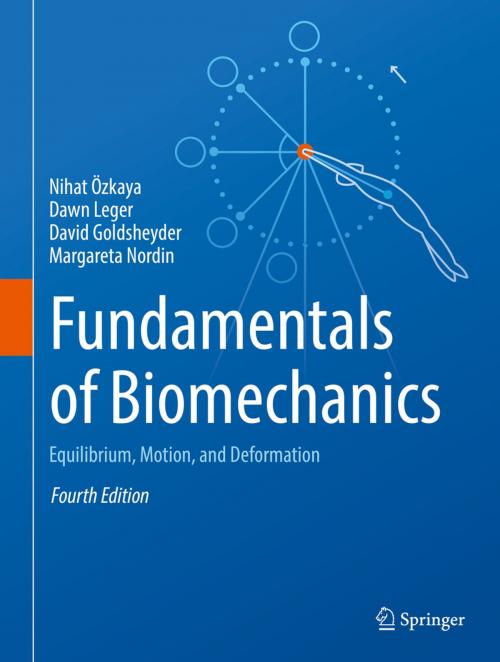Fundamentals of Biomechanics
Equilibrium, Motion, and Deformation
Nonfiction, Health & Well Being, Medical, Specialties, Sports Medicine, Medical Science, Physiology| Author: | Nihat Özkaya, Dawn Leger, David Goldsheyder, Margareta Nordin | ISBN: | 9783319447384 |
| Publisher: | Springer International Publishing | Publication: | December 24, 2016 |
| Imprint: | Springer | Language: | English |
| Author: | Nihat Özkaya, Dawn Leger, David Goldsheyder, Margareta Nordin |
| ISBN: | 9783319447384 |
| Publisher: | Springer International Publishing |
| Publication: | December 24, 2016 |
| Imprint: | Springer |
| Language: | English |
This textbook integrates the classic fields of mechanics—statics, dynamics, and strength of materials—using examples from biology and medicine. The book is excellent for teaching either undergraduates in biomedical engineering programs or health care professionals studying biomechanics at the graduate level. Extensively revised from a successful third edition, Fundamentals of Biomechanics features a wealth of clear illustrations, numerous worked examples, and many problem sets. The book provides the quantitative perspective missing from more descriptive texts, without requiring an advanced background in mathematics. It will be welcomed for use in courses such as biomechanics and orthopedics, rehabilitation and industrial engineering, and occupational or sports medicine.
This book:
-
Introduces the fundamental concepts, principles, and methods that must be understood to begin the study of biomechanics
-
Reinforces basic principles of biomechanics with repetitive exercises in class and homework assignments given throughout the textbook
-
Includes over 100 new problem sets with solutions and illustrations
This textbook integrates the classic fields of mechanics—statics, dynamics, and strength of materials—using examples from biology and medicine. The book is excellent for teaching either undergraduates in biomedical engineering programs or health care professionals studying biomechanics at the graduate level. Extensively revised from a successful third edition, Fundamentals of Biomechanics features a wealth of clear illustrations, numerous worked examples, and many problem sets. The book provides the quantitative perspective missing from more descriptive texts, without requiring an advanced background in mathematics. It will be welcomed for use in courses such as biomechanics and orthopedics, rehabilitation and industrial engineering, and occupational or sports medicine.
This book:
-
Introduces the fundamental concepts, principles, and methods that must be understood to begin the study of biomechanics
-
Reinforces basic principles of biomechanics with repetitive exercises in class and homework assignments given throughout the textbook
-
Includes over 100 new problem sets with solutions and illustrations















